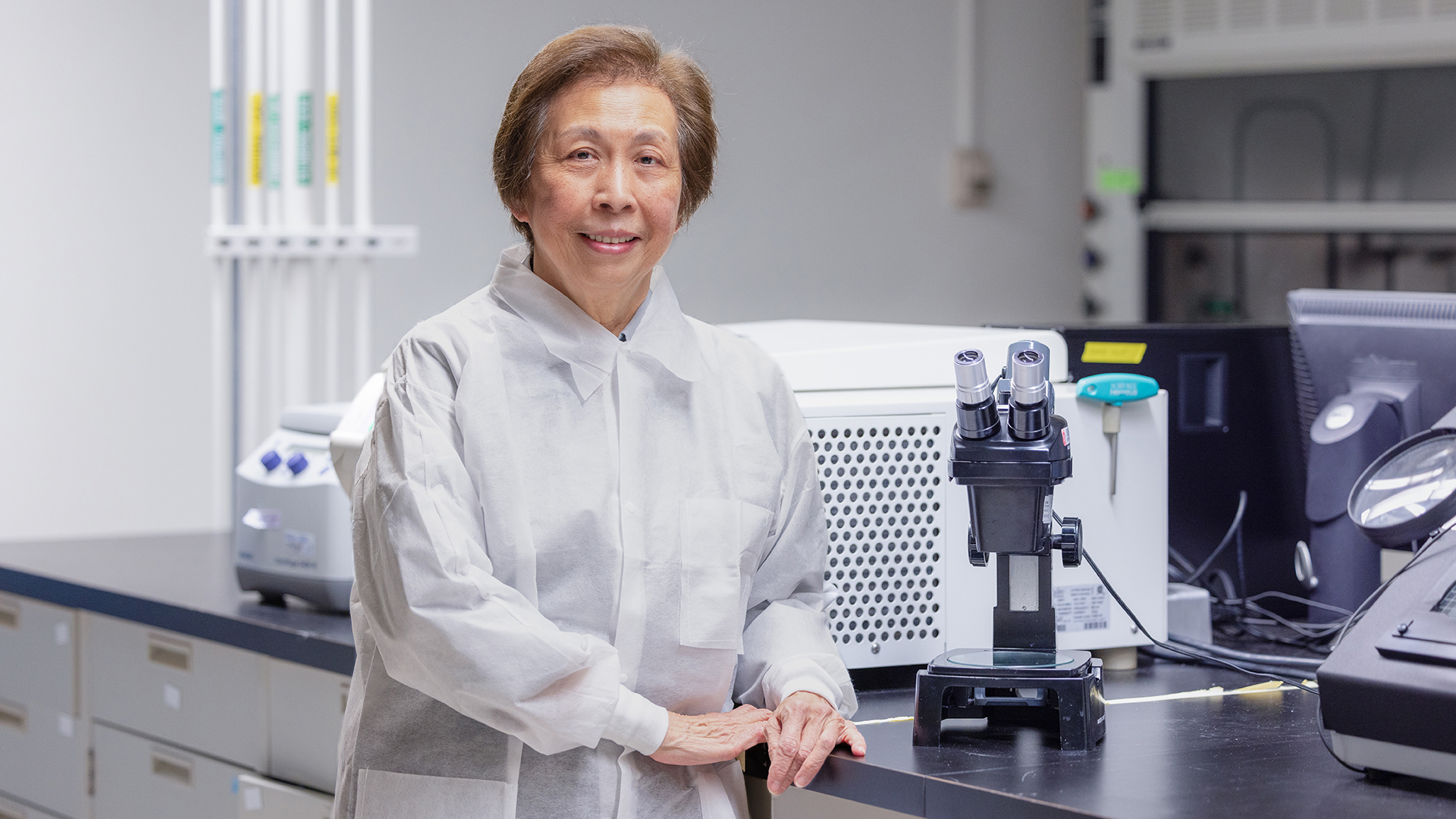
Pictured: SRI’s Biosciences’ Polly Chang stands with lab equipment.
The work, conducted by a multi-talented team of scientists, will provide critical data to help establish the safety of HOPO 14-1.
Inadvertent or malicious radiation exposure can have detrimental health impacts, and current treatment for internal radiation exposure is invasive and time consuming. SRI International has been working on the nonclinical development of HOPO 14-1, a novel orally administered experimental drug to treat radioactive contamination in the body, which is now in its first-in-human trial. Funded by the National Institute of Allergy and Infectious Diseases (NIAID), part of the National Institutes of Health (NIH), the trial seeks to define the safety and tolerability profile of HOPO 14-1 in healthy participants.
The development of this drug was especially novel as the previously approved transuranic radionuclide decontamination drug, diethylenetriamine pentaacetate (DTPA), can only be administered intravenously or by nebulizer—both of which are less feasible options for rapidly treating large populations than the oral route of HOPO 14-1. An easier administration route is key for quickly treating people in emergency radiation contamination situations. The work conducted in SRI’s Biosciences Division has been critical to the advancement to the Phase 1 clinical trial stage.
From a decade of drug discovery and development to the first-in-human clinical trial of HOPO 14-1
There are several situations in which a drug that can remove radioactive contaminants—or radionuclides—from the body may be necessary. Radionuclides may be released after natural disasters, during accidents affecting nuclear power plants or nuclear materials storage sites, or in cases of nuclear warfare. If these radionuclides are absorbed into the human body, they can damage DNA, tissues, and organs, posing a potentially long-term serious health threat. In order to mitigate severe adverse health effects in the event of radioactive contaminant exposure, the best treatment strategy is to administer a chelating agent—a compound that binds to radionuclides—that will decorporate, or remove, the radionuclides from the body as quickly as possible.
“Nonclinical studies of HOPO 14-1 showed that this is an effective and efficient radionuclide decorporation agent that works by chelating radionuclides in the body, allowing them to be rapidly eliminated,” said Polly Chang, Senior Scientific Director in SRI’s Biosciences Division.
Dr. Chang and her team collaborated with HOPO 14-1’s inventors, the late Dr. Pat Durbin and Drs. Ken Raymond and Rebecca Abergel from Lawrence Berkeley National Laboratory for more than a decade to develop this drug product.
“Our multi-talented team of scientists conducted the safety and pharmacology studies, supported the FDA filing, and is now conducting the Phase 1 safety clinical trial. SRI is uniquely qualified to do this work because we can perform all the requisite variety of tasks (safety, pharmacology, formulation, manufacturing, human clinical trials) and support efficacy studies that are performed in collaboration with partner institutions,” said Dr. Chang.
Future outlooks of HOPO 14-1: Advancing from clinical trials to the market
The main goal of the clinical trial is to demonstrate the safety and tolerability of this drug in healthy adults. Obtaining these results will be crucial to eventually making this drug publicly available and accessible.
“Results from this first-in-human clinical trial are important to understand both the safety of this product and how it is distributed in and eliminated from the body. We’re hopeful this work will pave the way for advancing the product towards eventual market approval,” said Dr. Chang.
SRI’s Plymouth, Michigan site is hosting the first-in-human Phase 1 clinical trial of HOPO 14-1, which is led by Sascha N. Goonewardena, MD, a physician-investigator at SRI’s Clinical Trials Unit. The trial began in April 2023.
More information on this clinical trial is available at clinicaltrials.gov under study NCT05628961.
This project has been funded in whole or in part with Federal funds from the National Institute of Allergy and Infectious Diseases, National Institutes of Health, Department of Health and Human Services, under Contract No. 75N93020D00011.
The total costs of this program are financed with Federal money; this program is currently funded in the amount of $44,496,261; none of the costs of this program will be financed by nongovernmental sources.


